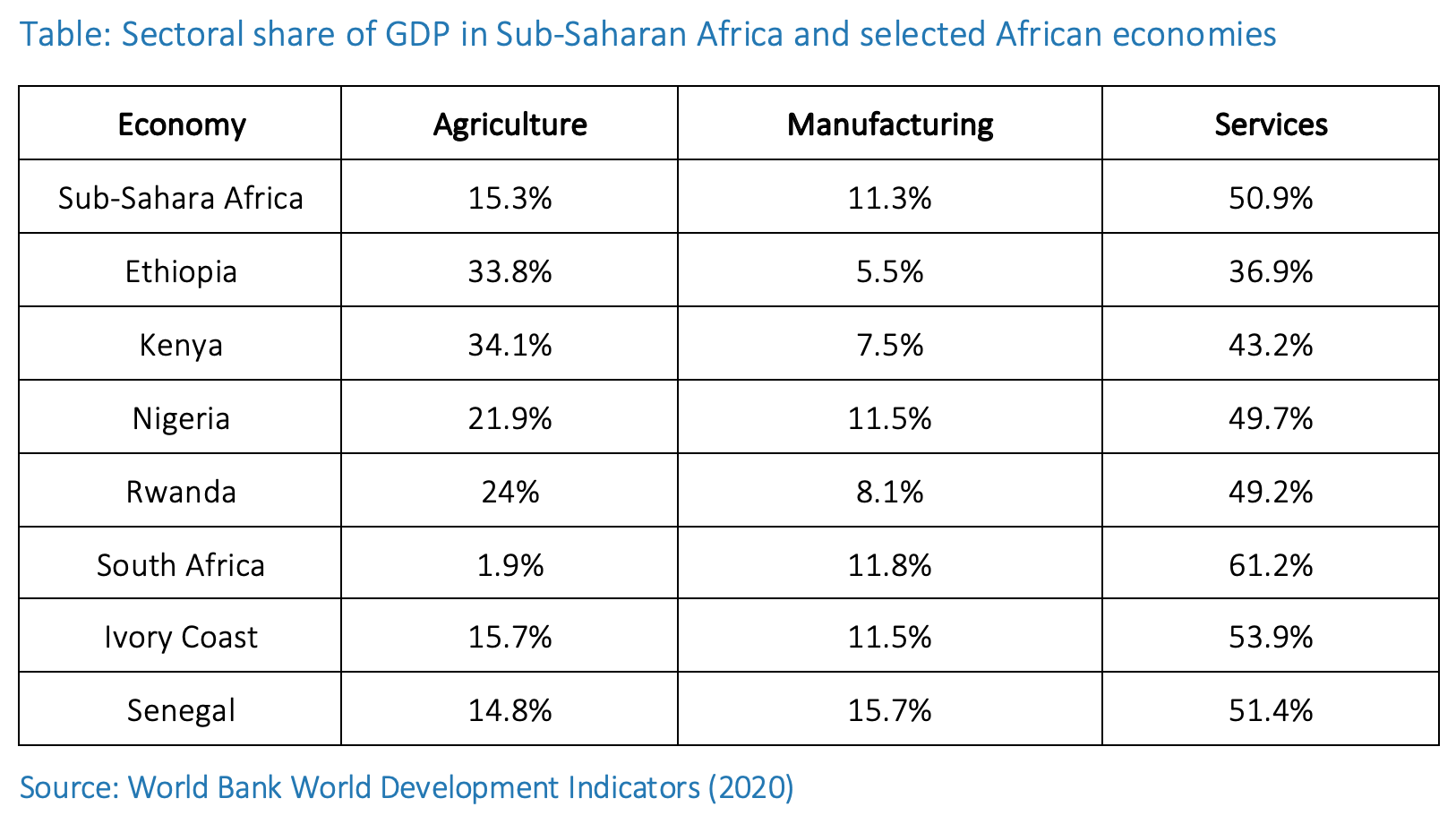Blog
Industrial development – the importance of services, regulation and good governance

Services, appropriate regulation and good governance are critical in industrial, and broader economic development. Services play a very significant role in Africa’s economic development; contributing, more to economic activity, than manufacturing and agriculture. The share of services (including wholesale & retail trade, transport, financial, professional, education, healthcare, real estate) to the gross domestic product (GDP) of Sub-Saharan Africa in 2019 was GDP was 50.9%, while agriculture and manufacturing contributed 15.3% and 11.3%, respectively. According to the World Bank World Development Indicators (2020), the contribution of services to GDP in Africa’s largest and fastest-growing economies (e.g. Nigeria, South Africa, Kenya, Senegal, Ethiopia, Ivory Coast & Rwanda) is by far higher than that of manufacturing – see details in the Table below.
In Africa’s total merchandise trade, exports from Africa are dominated by commodities, and imports are dominated by manufacturers. In intra-Africa trade, except for South Africa, trade amongst African countries is also commodity-focused. Diversification is an important objective for Africa’s economies; to support value addition to commodities, and also to increase resilience in the face of external shocks. Diversification is also critical to enhance Africa’s trade performance away from the vulnerabilities of commodity dependence.
It is against this background that we emphasize the importance of expanding productive capacity, diversification, and leveraging linkages across the economy to enhance competitiveness post-COVID-19. The pandemic has exposed specific deficits in Africa’s productive capacity; the capacity to produce not only essential goods but much more generally. COVID-19 has also highlighted the importance of rules-based trade and trade facilitation – both to provide access to products and services not produced locally, but also as inputs to productive activities. We therefore see that inward-looking policies will not work for African economies.
Infrastructure services such as energy, water, transport, communication play a significant role in enabling industrial development and processes, and in all economic activity. The lack of access to reliable and competitively priced energy services will be a major constraint, especially for small-medium enterprises’ development. Large companies will buy generators. The same will apply to communication and transport services. This means that infrastructure development to enable the supply of these key services is a priority to support industrial development and diversification / productive capacity development.
Infrastructure development must be accompanied by appropriate regulation. The issue of regulation links directly to institutional capacity requirements in government departments responsible for making and implementing policy and regulators responsible for implementing and managing regulation. This brings us to a broader issue of good domestic governance.
Good governance (including the rule of law, transparency, accountability, legitimate procurement procedures, enforceable remedies) supports the implementation and enhances outcomes of the policies. Intellectual property rights and investments need to be protected. Such a policy and regulatory environment would influence investment decisions (i.e. attract to domestic and foreign investment).
COVID-19 has challenged us to rethink our industrial policies and development processes. Post-COVID-19 industrial policies should support value chains and strengthen resilience to external shocks; in brief, they must address the realities of a 21st century economy. This means that industrial policies have to focus more broadly than only on core manufacturing. They must recognize and the support linkages across sectors, and leverage specifically the role of services, regulation and good governance.
About the Author(s)
Leave a comment
The Trade Law Centre (tralac) encourages relevant, topic-related discussion and intelligent debate. By posting comments on our website, you’ll be contributing to ongoing conversations about important trade-related issues for African countries. Before submitting your comment, please take note of our comments policy.
Read more...






